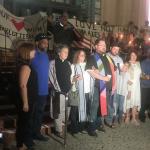Last evening I met with some of my students at Lexington Theological Seminary in an online conversation about race, preaching, and the church’s response to the events in Charlottesville, Virginia. The KKK/Nazi rally with white people carrying torches and threatening clergy and counter-protesters resulted in numerous injuries and one death by vehicular homicide. I asked my students how many of their pastors were willing preach about Charlottesville or acknowledge what had happened in some way – either in the prayers, a moment of silence, or even in conversations before or after worship. Almost all of them said that their pastor said nothing about it in their sermons. In some churches there was complete silence about what happened.
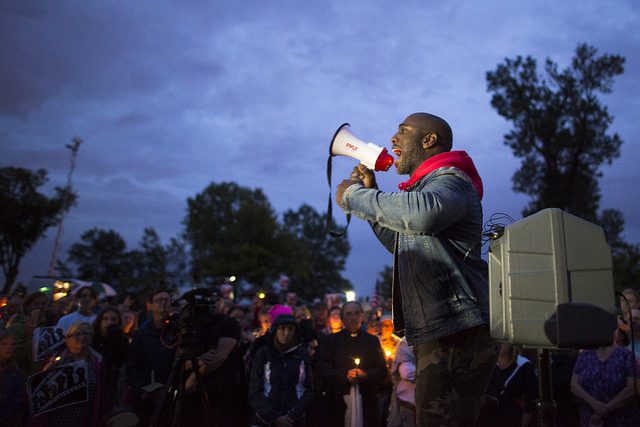
I also followed some Facebook threads where people posed the question about whether their pastor addressed the events in Charlottesville. Some responded that they did hear (or preach) sermons that directly spoke to the need to confront white supremacy and racial hatred. But many others lamented (or raged) that there was radio silence in their congregations.
This Sunday – no excuses
As a pastor who served a congregation for 16 years, I understand how difficult – and sometimes impossible – it is to change or tweak one’s sermon at the last minute. Charlottesville was not on every pastor’s radar simply because they were on vacation or had not heard the news or picked up the threads on social media. For others, previously planned events and liturgies precluded mentioning Charlottesville. For example, if a church has planned a big service celebrating the end of VBS and the children have helped with the sermon, it would be unfair to switch things at the last minute.
But this Sunday you have no excuse for not addressing Charlottesville and the realities of racism in America. It’s early in the week. You have the time to think about how to work it in. More importantly, you have the moral and ethical obligation as a preacher of the gospel to speak a word. [And if you’re looking for ideas for approaching the lectionary texts for Sunday, read 8 Ways to Preach about Charlottesville, White Supremacy, and Racial Justice.]
Here are 9 reasons why you need to talk about Charlottesville in church on Sunday [And if you’re concerned about negative push-back from your congregation, read this: How to Preach When You Are Afraid]:
1. Because you are a role model.
Your community is looking to you to model for them how to respond. The Sunday after Kristallnacht in Germany, do you know what Pastor Julius von Jan said in his sermon denouncing the Nazis? “The truth has been spoken aloud before God and in God’s name. Now the world may do to us whatever it wishes. We stand in God’s hand. God is faithful. But you, O Land, Land, Land, hear the word of the Lord.”
2. Because you are brave.
Von Jan’s sermon and others by pastors brave enough to preach against the Nazis can be found in the excellent book edited by Dean G. Stroud, Preaching in Hitler’s Shadow: Sermons of Resistance in the Third Reich. If you need inspiration for “preaching in Trump’s shadow,” get this book and read it. Even better – read it with members of your congregation! [Not feeling very courageous these days? Try reading this: How to Preach When You Are Afraid.]
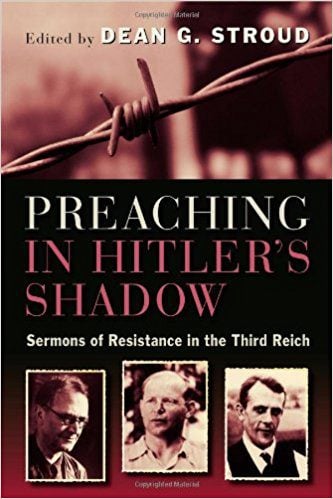
3. Because the church has not done enough.
In his preface to the anti-Nazi sermons, Stroud asks the question we will all be asking in hindsight when we look back at this moment in American history: “What should the church have done?” He answers: “The obvious response is that the church should have spoken directly and boldly against Hitlerism and anti-Semitism,” (ix – x).
4. Because the gospel commands us to speak out against injustice.
As a preacher and as a Christian, you are obligated to speak truth to power. Full stop.
5. Because you have decided to be concerned about more than your own self-interest.
In her essay, “The Role of the Churches: Compliance and Confrontation,” Victoria Barnett explains the church’s failure in Nazi Germany: “Perhaps at the heart of those failures was the fact that the churches . . . sought to act, as institutions tend to do, in their own narrowly defined ‘best’ interests. There was little desire on the part of the churches for self-sacrifice or heroism, and much emphasis on ‘pragmatic’ and ‘strategic’ measures that would supposedly protect their institutional authority.” My research about pastor’s willingness to address controversial justice issues corroborates this theory. Many are worried about being chastised by their parishioners for being “too political,” chasing away the moneyed people from the pews, or even losing their jobs. Those are valid concerns. But there are ways to preach prophetically and still maintain your pastoral relationships. Don’t let a sense of cowardice override your call to preach the gospel. (Barnett’s quote is from The Holocaust and the Christian World: Reflections on the Past Challenges for the Future, ed. Carol Rittner, Stephen D. Smith, and Irena Steinfeldt (New York: Continuum, 2000), p. 57, quoted in Stroud, p. 3).
6. Because people of color, Jews, LGBTQ folks, the disabled, people of other religions and countries are all counting on you.
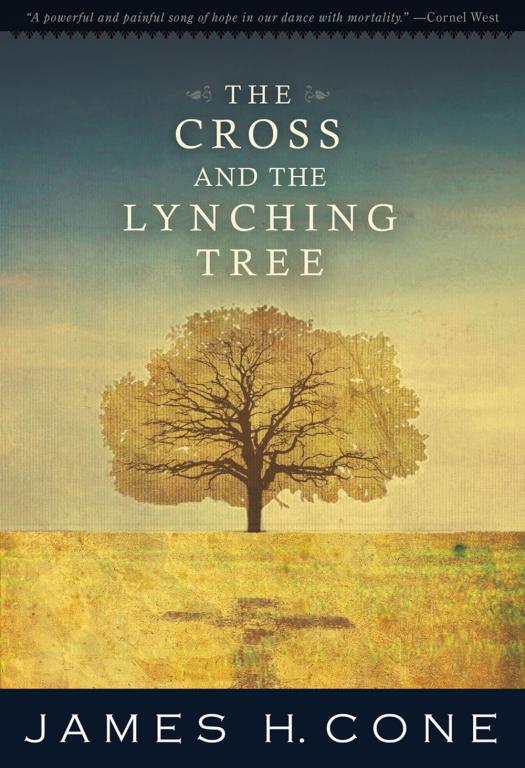
In his excellent book, The Cross and the Lynching Tree, James Cone asks “How could powerless blacks endure and resist the brutality of white supremacy in nearly every aspect of their lives and still keep their sanity?” He concluded that “an immanent presence of a transcendent revelation confirming or blacks that they were more than what whites said about them, gave them an inner spiritual strength to cope with anything that came their way,” (xviii). You are called to preach that immanent presence of a transcendent revelation and confirm that blacks and all historically marginalized peoples are more than what whites say about them. Don’t let them down.
7. Because people want to talk about this more than you realize.
As difficult as the conversation is, people are longing to talk about racism, homophobia, sexism, and all the other “isms” that they know exist, but don’t know how to confront. Yes, there will be strong feelings – guilt, shame, frustration, even anger. But as Cone observed in his own confrontation with these issues, “anger soon gave way to a profound feeling of liberation.” He said that being able to write about lynching liberated him from being confined by it. Your parishioners deserve this same chance at liberation. [Visit “The Purple Zone” for more ideas on how to talk about controversial justice issues in the midst of the red state/blue state divide.]
8. Because the cross has liberating power you’re not tapping into.
Cone notes: “The cross helped me to deal with the brutal legacy of the lynching tree, and the lynching tree helped me to understand the tragic meaning of the cross.” Invite your congregation to do a book study of The Cross and the Lynching Tree. Not everyone will say yes. But some will. And this will “start a conversation can explore so we can explore the many ways to heal the deep wounds lynching has inflicted upon us,” (xix). I agree with Cone that “the lynching tree can help us to see Jesus in America in a new light, and thereby empower people who claim to follow him to take a stand against white supremacy and every kind of injustice,” (xix).
9. Because your preaching can make a difference.
Never underestimate the power of your words to plant seeds, water seeds already planted, and even inspire people to take action for justice, healing and reconciliation. “It was Jesus’ cross that sent people protesting in the streets, seeking to change the social structures of racial oppression,” Cone reminds us (28). Preach the crucifixion and resurrection and just watch what happens next.
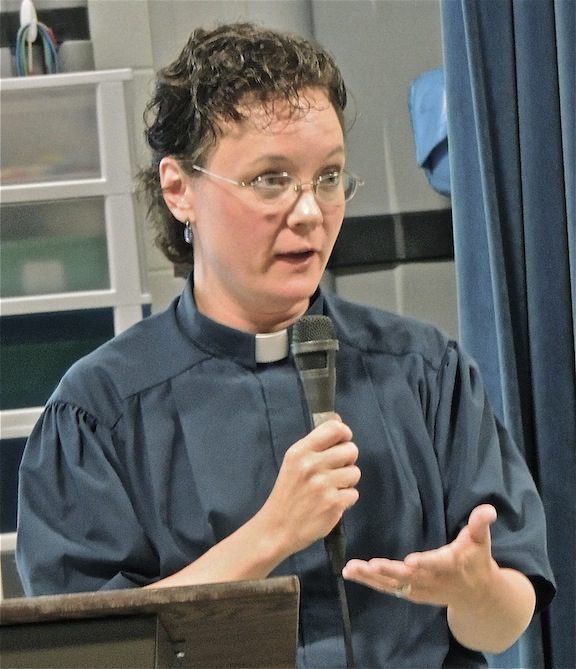
Leah D. Schade is the Assistant Professor of Preaching and Worship at Lexington Theological Seminary (Kentucky) and author of the book Creation-Crisis Preaching: Ecology, Theology, and the Pulpit (Chalice Press, 2015).
You can follow Leah on Twitter at @LeahSchade, and on Facebook at https://www.facebook.com/LeahDSchade/
See also: How to Preach When You Are Afraid
8 Ways to Preach about Charlottesville, White Supremacy, and Racial Justice
See Leah’s sermons addressing the events of Charlottesville:
The Harp Sermon: A Response to Charlottesville and Racial Hatred



